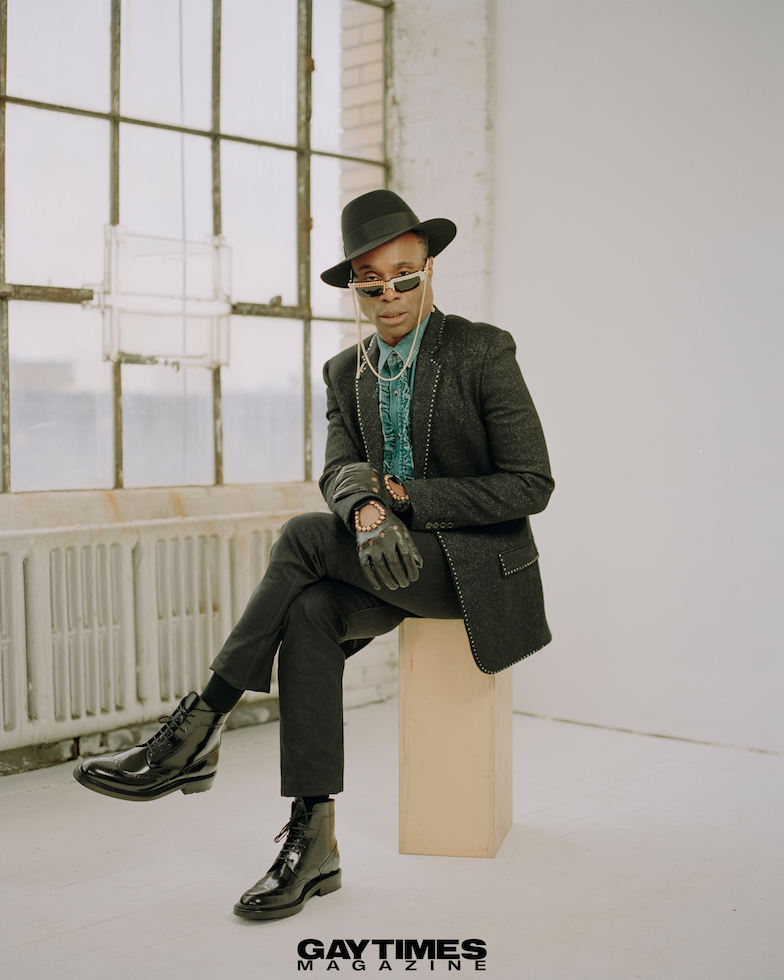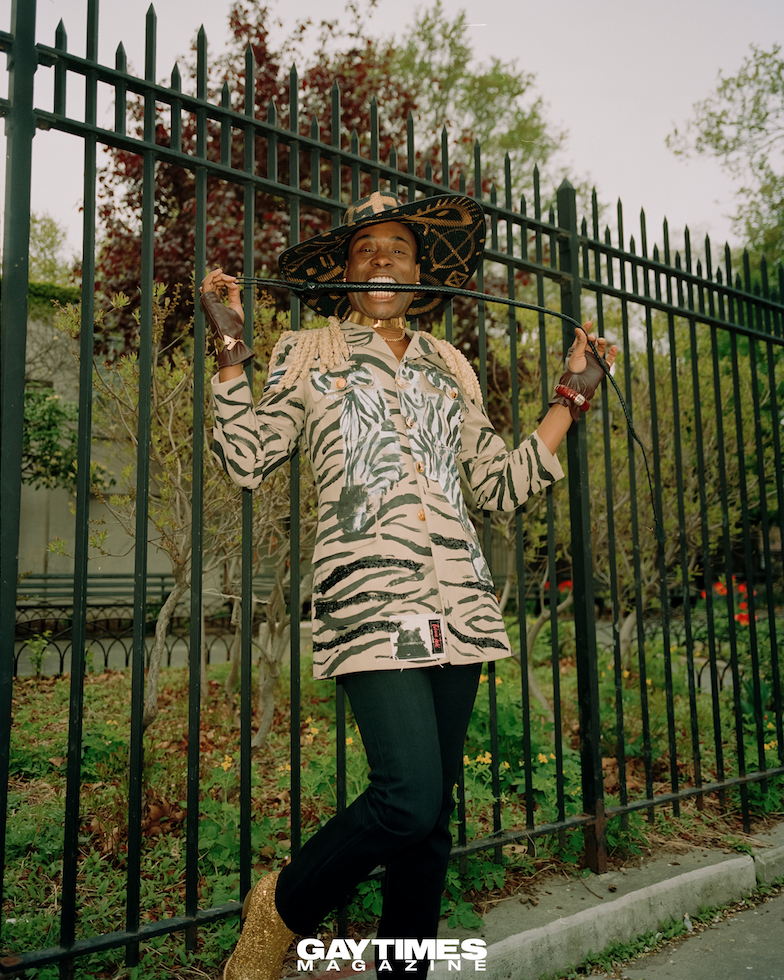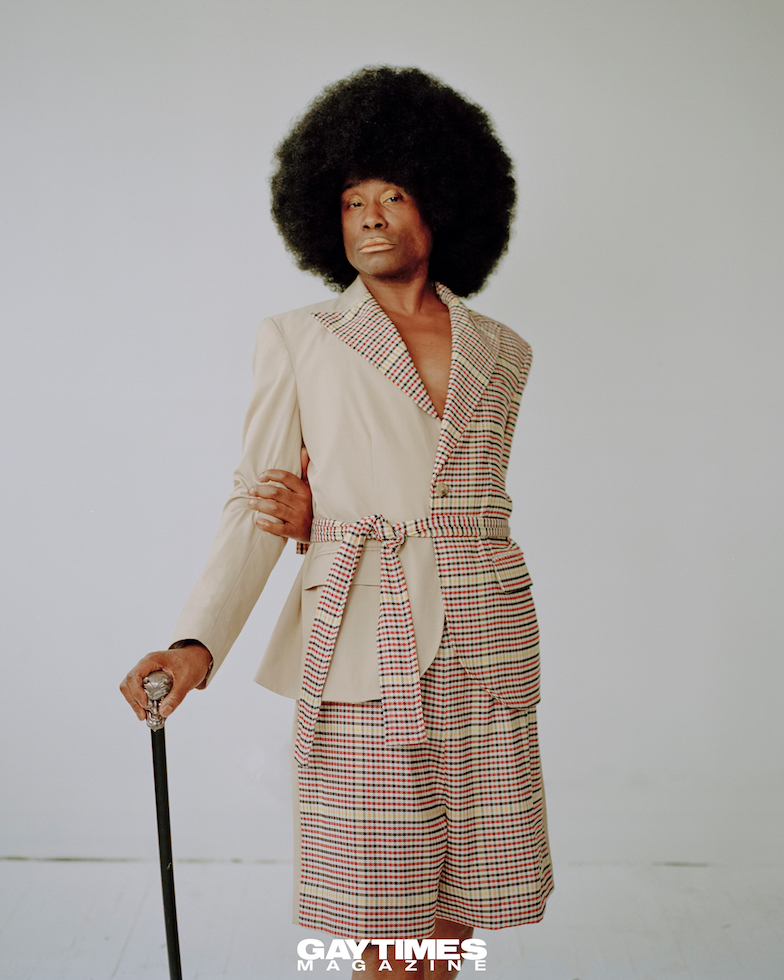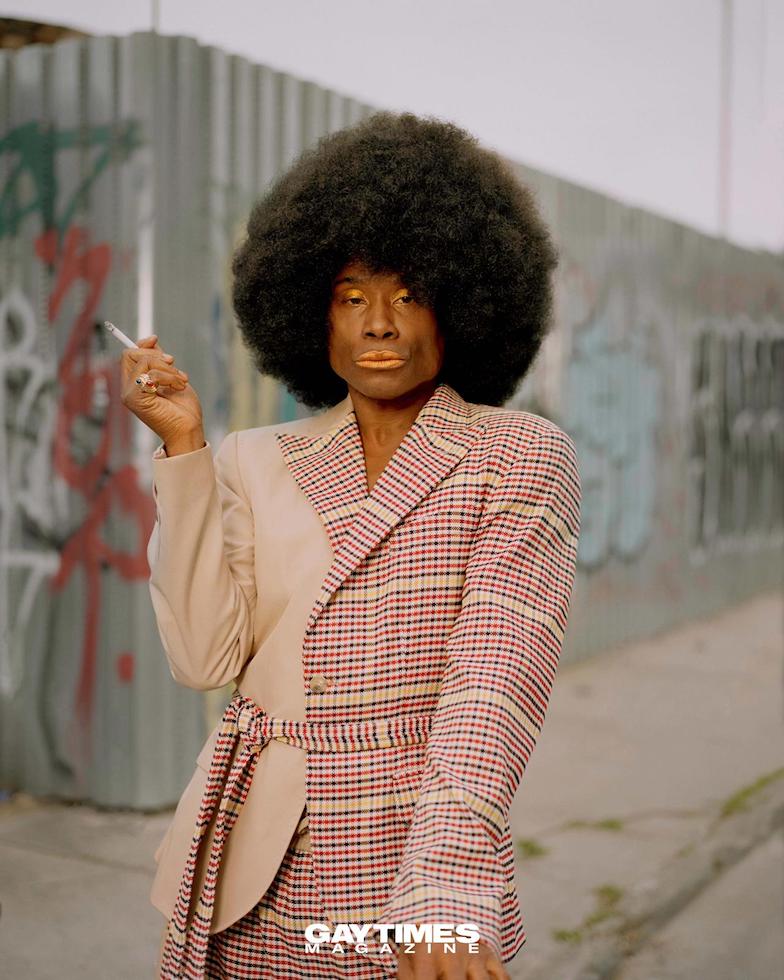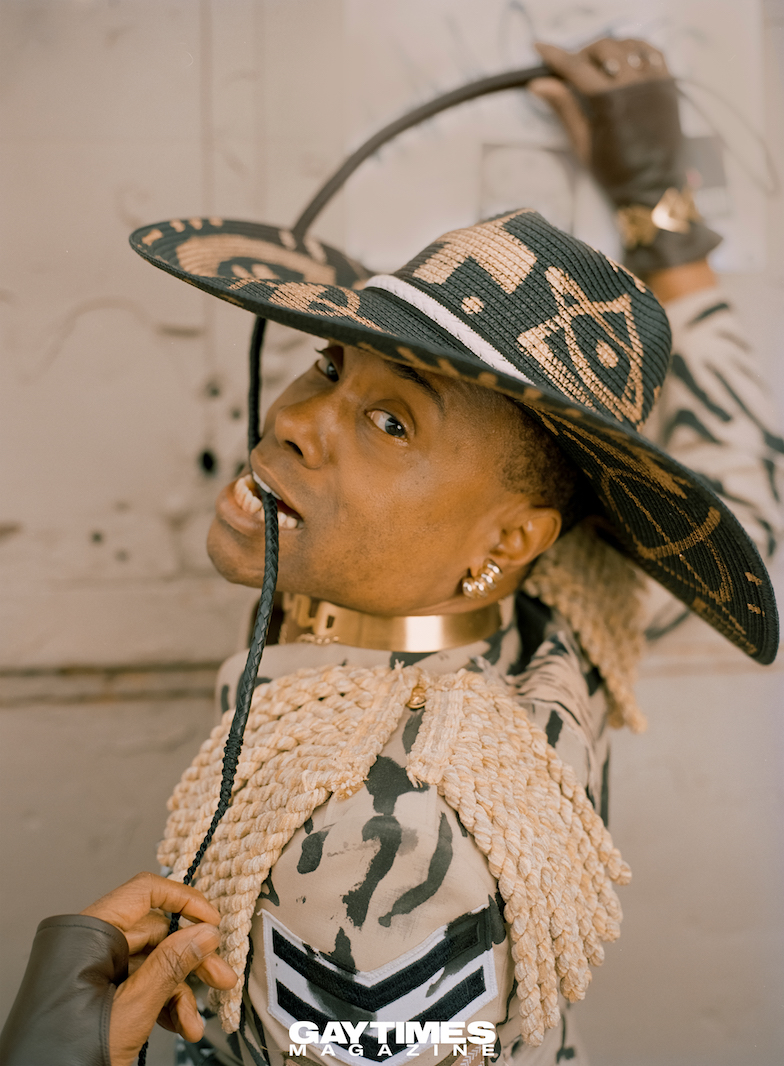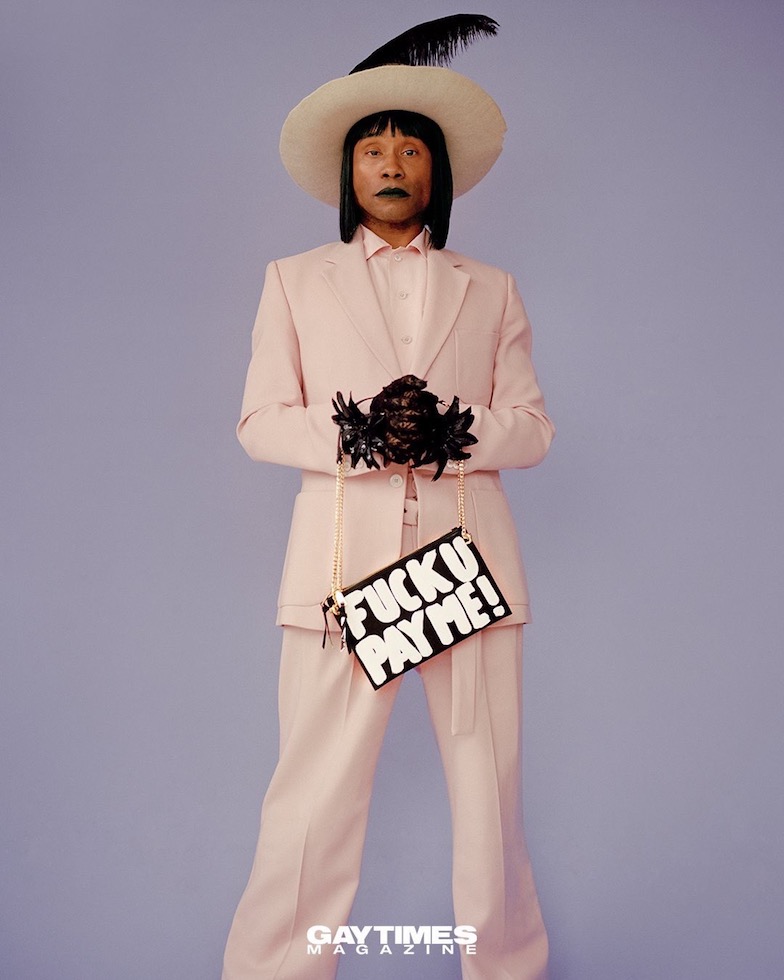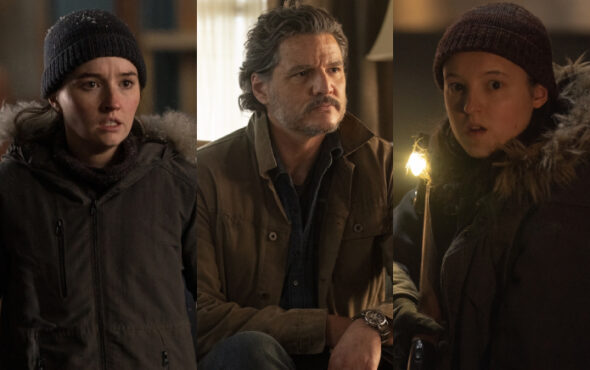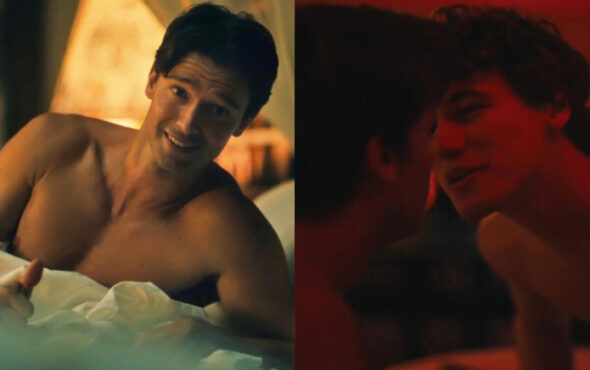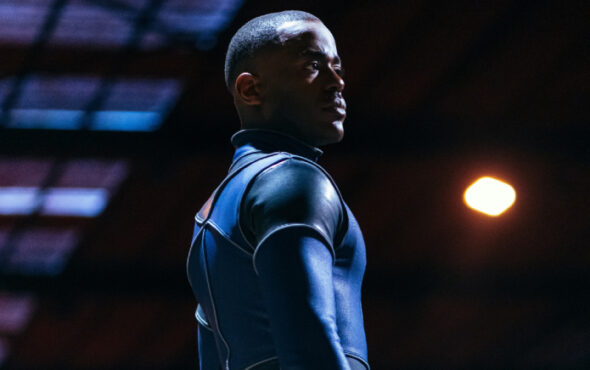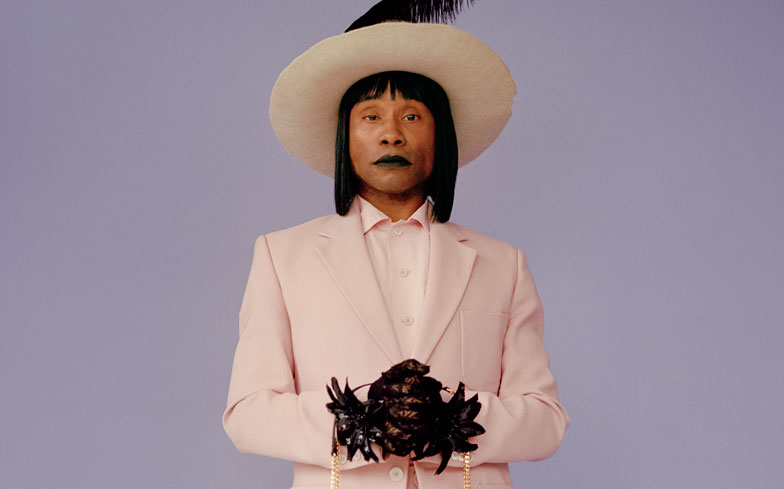
“I thought, ‘You’re a faggot, you can’t do that!’ But yes, I can. Yes I can, and yes I will. I want to be the person,” proclaims actor Billy Porter as he crosses New York City the morning before a day on set for the second season of Ryan Murphy’s Pose. “I want to be one of the people that is at the forefront.”
Recognised across the globe for his Emmy-nominated turn as Prey Tell, the experienced ballroom emcee who’s here to “teach the children”, it’s not just Billy’s turn on the show that’s got us all talking. Away from the television screen and on the red carpet, the actor has turned out lewks that almost, just almost, upstaged Lady Gaga recently at the 2019 Met Gala.
But alongside looking fierce and turning heads, the looks come with a hidden message from Billy: I am living my truth and your boundaries of masculine and feminine don’t belong anywhere near me.
“We have a construct in our society that certain things mean masculine and certain things mean feminine and you can’t cross those boundaries and not be marginalised or ostracised for it – silenced or dismissed for those things,” Billy says. “Men are under this microscope from the moment you hit [the red carpet] and everybody is looking to see if you slip up. One slip up and you’re a faggot, and you can’t be on that superhero show anymore. You can’t play that masculine part anymore, and nobody will believe that you’ll fuck a woman anymore. And so, I looked at the landscape and saw that these men are straitjackets. Literally ‘straight-jackets’. They can’t do anything without someone judging their fashion choice in relation to how they’ll get cast.”
Walking down 8th Avenue and “ready to jump right in,” Pose writer and trans activist Janet Mock speaks with her friend Billy Porter about making history, turning out the fashion, and discusses how their work today has a close connection to the lost generation of the HIV/AIDS crisis.
Janet Mock: You are covering the Summer of Pride issue, it’s the 50th anniversary of the Stonewall rebellion – what does that mean to you?
Billy Porter: I feel like it’s so significant for me because I was actually born that year of the Stonewall Riots. I’m going to be 50 this year and was born right after in September. I really came out during the AIDS crisis and I feel like I have become – just sort of having lived my life fully, openly as a gay man, out in all of my communities in my work – like it’s my generation’s turn to lead. It’s significant for me because that’s the difference now, for me, it reminds me that the work is never done. It started then and it continues now and to be part of that mission, to be part of that civil rights movement, is really important to me. I stand on the shoulders of my black folks who came before me and know what it feels like to be disenfranchised. It’s a continued call to action for me and I hope that everybody in the LGBTQ community can come together and continue to fight for equality. I hope that’s what I exude.
JM: You came out 16 years after the Stonewall rebellion. You were 16 at the time, 1985, growing up in a pentecostal family in Pittsburgh.
BP: Yeah!
JM: Had you known that history at the time? How did you find resources to find your own sense of ‘This is who I am’ and ‘These are my people’?
BP: Not really, the only thing I had was trying to find my tribe. I was trying to get out of my circumstances and remove myself from the trauma and the toxic energy that was my childhood and my early teenage development. It was very traumatic and it was homophobic – it was violently homophobic and I knew then that if I was going to survive, I was going to have to extract myself from that. I found the arts and I found the theatre, a community that embraced me for who I am, and as I went deeper and deeper into that community, I discovered we were in the middle of a plague and had to fight. I remember I would come in the summer between school to NYC to try and get work. I think it was my sophomore year I came to New York and booked a gig, Joseph and The Amazing Technicolor Dreamcoat in New Jersey. All the gays sort of took me under their wing and my friend Michael said, ‘What are you doing Sunday?’ I said ‘nothing’ and he said, ‘Meet me at that church on 5th Avenue’. He didn’t tell me what it was, and when I arrived, it was a group of people and he threw a shirt on my that said SILENCE = DEATH. I was a bit late and the march was starting, I didn’t know I was going to one or knew I was going to Gay Pride, and we started walking down the street with everybody chanting, ‘ACT UP, FIGHT BACK, FIGHT AIDS’. There I was, in the middle of ACT UP, and was completely transformed that day. All the information I needed was right there and I knew that there was no turning back.
JM: I love that idea of finding your tribe. So much of Pose is literally about finding your people, and for me working on this show was about this calling. Ryan Murphy called me, I came to a meeting and my life transformed and changed. Was your experience similar to that when you came in to audition for ‘MC’ that turned into Prey Tell?
BP: I’ve spent 25 or 30 years in this business trying to fit in because that’s what I was told. I was told in every community – even in my tribe – that if I didn’t ‘fix’ myself and put on the extra layer of performed masculinity through the lens of the heterosexual normative construct, I would not be successful and not be able to work in the way I wanted to work. That I wouldn’t be taken seriously and a lot of those things were true for a very, very long time. Something inside of me understood that my authenticity was the only thing that made sense. I chose early on in my career that if I couldn’t be authentic in this show business world in the traditional sense of being a television actor, crossover artist, being a celebrity – whatever comes with that – if I couldn’t do it authentically then I didn’t want to do it because it would be a lie! I didn’t want to lie for the rest of my life. I got very used to being marginalised and being put in a corner; my talent, my gift, my passion – all of what I brought to the table being put in a box in a corner. When Pose came around, it was literally like, ‘Wait, we’re going to actually tell the real story?’ I’ve always had big dreams, but I didn’t even realise that I was not dreaming big enough. I didn’t realise that the information I had received had put a cap on my dreams – a ceiling – until I walked through that door and met Ryan Murphy. I met Steven Canals and I met you, and this project came to be. This experience has taught me to dream the impossible and that’s an energy and focus that we all need to take into whatever this next phase of what we’re doing right. Whatever is going on, we had to remember that anything is possible and dream the impossible. I am very much a person who believes in the law of attraction. You are what you say and you are what you say you are. Pose has really helped me change my language and dream the impossible and believe that we can change the world.
JM: What was the cap when you first walked into that audition room?
BP: I always felt like – this was the messaging I received – that you as a black gay man are allowed to be this and that is it. You can be the best friend of the white girl or the white boy; you can bring up the rear or be the funny best friend; you can be the talented funny best friend; you can stop the show on the side, but when it comes to the ‘at what cost’ portion of the story or the human story, there was no space for that. I was not happy about it but very used to being plugged into those archetypes. I never imagined that I could be a black, gay, out leading man. I never saw that in my future. I never saw that because it never existed. When all of our dreams are springboarded off our dreams that we’ve already seen, it’s difficult to dream things. And then, to move forward without hubris, knowing that is who you are. Something inside me always knew I was one of the first, but I didn’t see anybody that was succeeding in that way quite frankly. I kinda felt like I’m going to try, do it and keep going. But y’know, I’m going to have to butch it up if I want to be on TV. If I want to be in the movies, I’m going to have to make myself masculine enough so it’s palatable and stomachable for the masses.
JM: I had a moment with you when Ryan came back into the writer’s room after the first round and said, ‘We found our people, we found our stars… and we’re going to create a role for Billy Porter that was not written in the original pilot script.’ I remember being like, ‘Oh wow, this is our adult!’ We’re going to anchor all the history of this scene, the ballroom scene and community, black civil rights, NYC gentrification and the HIV/AIDS epidemic which is crawling up and being present, and give it all to Prey Tell so they can give it to Blanca and the children. We knew very clearly as writers that you are our leading man. For you, when was the moment you had to step into that leading man space on set?
BP: I didn’t really even know that was what I was doing, it was written that way. I’m an actor so I show up and try to do what’s required and what the work tells me to do. I wasn’t looking at it like leading man or supporting or any of that until the awards stuff started coming out, the classifications and I saw that you guys were putting me up for ‘Best Lead’. I had lunch with Ryan and said, ‘I want to talk about this leading man thing, are you sure you that’s where you want to put me? It’s an ensemble piece, we’re pretty much all supportive apart from Blanca really who kind of carries the show on her back, I feel like we’re all part of an ensemble.’ He said, ‘You’re our leading man.’ I was like, ‘Yeah but…’ and he was like, ‘You’re our leading man and this is what we’re doing because it has never existed before, and the world needs to see what it looks like. You are our leading man. You’re a black, out, gay leading man and the world needs to see what that archetype is – you are the representation of that and what we’re doing, so pull it together.’ It was like, ‘Okaaaaaay’. It was really transformative because I remember when I was in drama school, they’d cast me as Romeo and I was like, ‘I don’t feel comfortable with this because I don’t know if I can live up to the expectation of the masculinity microscope. I don’t know if I can fool people like that’. In 1987, the only archetypes for black men were James Earl Jones as the patriarch, Denzel Washington as the sexy leading man archetype, and Eddie Murphy who was the brilliant clown archetype – and they were all straight, and some of them often violently straight. So, I didn’t see a place for me, so I really marginalised myself in that moment for a number of years just in order to work. I always thought I would be able to come to town, play my trump card and then expand from there. The expansion didn’t happen until now and that was really frustrating until these last six years when everything has cracked open and I feel like all the decisions I’ve made that seemed to be my liability are now paying off!
JM: You get nominated for Outstanding Lead Actor in a Drama Series for Pose and you show up for the Golden Globes in a custom Randi Rahm piece that’s pink…
BP: The lining was pink!
JM: Embellished to the gods! From the Globes to the Oscars to the Met Gala, how do you use fashion as an interrogation of those archetypes of what a leading man is?
BP: One of the instruments of silencing that I came across when starting is this idea of clothing. This idea of how you present. The first impression is what people see, right? We have a construct in our society that certain things mean masculine and certain things mean feminine and you can’t cross those boundaries and not be marginalised or ostracised for it, silenced or dismissed for those things. I’ve always had an outrageous sense of style and fashion. I’ve very often been laughed at for the kind of things I wanted to wear. This microscope of masculinity within the media. Men are under this microscope from the moment you hit [the red carpet] and everybody is looking to see if you slip up. One slip up and you’re a faggot, and you can’t be on that superhero show anymore. You can’t play that masculine part anymore, and nobody will believe that you’ll fuck a woman anymore. And so, I looked at the landscape and saw that these men are straitjackets. Literally ‘straight-jackets’. They can’t do anything without someone judging their fashion choice in relation to how they’ll get cast. When I came into this moment, I realised that it’s been very clear, to me, that nobody thinks I’m masculine anyway, and now I’ve got the job where that lens is no longer plausible and doesn’t matter. I’m Pray Tell on Pose; I’m queer, I’m out, I’m fabulous, I’m a leading man and I’m running shit. I don’t have to adhere to any of these rules and I can go onto these red carpets and play because it doesn’t matter. Y’all weren’t casting me as that anyway, and I still survived and I’m still here. So I need to do it the way I want to fucking do it! I didn’t even realise that there was any kind of gender-neutral dresses. I didn’t realise that was what I wanted to do until I was set free by actually getting this job, and then all the limits were taken off. You can do whatever you want!
JM: When Ryan was directing the pilot and those ball scenes, walking on that runway and teaching the ball goers how to move and directing them with the cameras, it brought out the showmanship and brought out a part of his gender he never realised he had been suppressing. I wondered on that stage watching that all go on with those actors and a lot of the trans women on the show, did that propel you to feel even more liberated and bring out that sense of yourself?
BP: Absolutely, absolutely! The thing for me was that I realised how – in those moments and sequences, the act of being submerged in this culture and this way – I’d been so moved by what it means to be authentic. We talk about authenticity and throw inclusion and authenticity around like we’re doing it. I showed up and I saw this community, specifically the transgender community. I realised that the T in LGBTQ has largely been absent from my knowledge and my consciousness. I just didn’t know how much I didn’t know and it awakened something in me because I saw these people and thought, their authenticity – as bad as it’s been for me – these people living inside their authenticity can get them killed every single day. Every single day, these girls walk out their house and onto the streets. They can be killed simply because somebody feels like it’s alright, nobody will give a fuck, anyway. These trans women can be executed simply for living inside a real kind of authenticity that is not popular. It really moved me because that’s the death of authenticity that I didn’t know I didn’t have, and I need to get it and I need to embrace it. One of the ways I do and I’m going to express that is by taking the chains of what I’m wearing. It feels very insignificant but simultaneously I realise now how important it is, really it is to… I don’t know, it’s blowing my mind and I’m trying to find the words for it because it never occurred to me that I was the first man to wear a dress to the Oscars. For real. It never occurred to me that going to the Met Gala in what I went to was a big deal. It’s literally me being me. It really is me being me and that’s so great because the layer of having to pretend to make other people feel comfortable is completely gone. It’s so freeing Janet, I can’t tell you!
JM: One of our greatest collaborations was working with you on episode six of season one, Love Is the Message. I feel like it’s the thing we birthed together; me as co-writer and director and you truly taking centre stage and telling this story that Ryan said is a ‘memorial to all those we lost to HIV/AIDS’ and all those who were left behind and survived. I remember you telling me in one of the scenes that you’re one of the first generations to survive this plague and we’re still dealing with all this trauma. With you embodying Prey Tell and him losing one of his great loves, what has that episode done for you personally and professionally?
BP: I realised that time, I survived for a reason. We have survivor’s guilt, I know I have survivor’s guilt. It’s always been, ‘What am I here for?’ I wanted to use who I am to really make a difference. ‘What am I here for, what is this?’ When I read that episode it was like, ‘Oh my God! This is what it is. I survived so I can tell the story!’ The images and the ghosts came flooding back at me. All of my friends who had passed away came to me in dreams and visions and they were happy and said, ‘Tell the story, tell the story. Tell the truth and tell the story’. For me to be the one who gets to remind the world that we were here, we’ve always been here and we are not going anywhere, is a very powerful place to be. It’s been empowering, earth-shattering and it blows my mind every day.
JM: I can’t let you go without teasing about how we go deeper into season two of Pose. What scenes can you reveal for readers of GAY TIMES?
BP: We go deeper. From what I know right now, we see Prey Tell’s rage turn to action. How do we make it active, I think that’s what it’s reminding me of? We’re in this position now where we’re literally being required to go back out into the streets and fight for the same shit we just won. The rage it has put inside of me has blinded me! I’m almost blind and getting to go to this job every day and place that rage somewhere that feels active is reminding me and helping me in my regular everyday life to channel my rage once more.
JM: We have activism pieces in season two, what would you say to that 16-year-old kid about Pride, possibility and about dreaming bigger?
BP: I would say that the first thing you must do, which I did, is extract yourself from the danger. Extract yourself from the people who don’t know how to love you. Extract yourself from anything that’s toxic. Change the narrative of, ‘I need the love of people, my mother, my father, my family to exist on the planet’. No! We don’t need acceptance, we don’t need tolerance, we need respect for our humanity. We demand respect for our humanity and we will give respect for everyone else so that we can all move forward. Everybody’s humanity is valid, even if we don’t understand it or like it. That’s what I would tell my younger self and anybody today that you must do. You must break free. It’s the only way you will survive.
JM: And finally, what does the dream look like now you don’t have that cap?
BP: OH BABY! I need to be The Head Bitch in Charge, hunni. I’m trying to be a mogul. I’m trying to be like Ryan Murphy, I’m trying to be like you! Yes, that’s what I wanted, but I thought, ‘You’re a faggot, you can’t do that!’ But yes, I can. Yes I can, and yes I will. I want to be the person. I want to be one of the people that is at the forefront of being, to be the Svengali that helps to make sure all the stories are told and that all the babies are taken care of. If I can be a part of that energy, I’m good.
Photography John Novotny
As told to William J Connolly
Fashion Sam Ratelle at RRR Creative Agency
Hair Nathan Juergensen
Hair Melissa DeZarate
Fashion Assistant Ashley Marie
